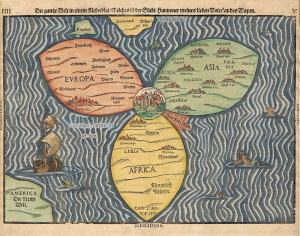By Mary Fairchild
1581 Bunting Clover Leaf Map; Israel in the center.
2 Kings 17—HOSHEA, ISRAEL’S LAST KING: reigned nine years and was imprisoned. In 724 B.C., Shalmaneser V marched on Israel. Hoshea released from prison, met him with the overdue tribute money, but it was too late. The Assyrians put Samaria under siege; the capital city withstood for three years, but in 722 B. C. the end came, and the people of Israel were carried away captive to Assyria. The ten tribes taken in the Assyrian captivity were often spoken of as the ten lost tribes, for they never returned to live in the land of Israel again. Thus the history of these tribes is a closed book.
However, GOD STILL KNOWS WHERE EACH INDIVIDUAL JEW IS, AND NOT ONE HAS BEEN LOST TO HIM, FOR IN THE FUTURE TRIBULATION PERIOD 144,000 JEWS (12,000 from each tribe) ARE MENTIONED. Only a small remnant that had already intermarried with the heathen returned to the land of Israel. This remnant settled in Samaria, but they were not full-blooded Jews and were called Samaritans. Their worship mingled with the heathen religions and was never corrected; it was always a mixture of error and truth. In Christ’s day, the Jewish nation was so prejudiced against the Samaritans (of mixed blood and mixed religion) that the Jews traveled around the land of Samaria rather than to travel through it.
ISRAEL—NO LONGER A NATION, ONLY A PROVINCE—2 Kings 17: The deported Israelites were scattered throughout the Assyrian Empire. “….the Lord removed Israel out of his sight, as he had said by all his servants the prophets. So was Israel carried away out of their own land to Assyria unto this day” (2 Kings 17:23). God warned them and described the consequences of their dissolution in Deut. 28:15-68. The Assyrians deported the Israelite population to various parts of the Assyrian empire and imported a foreign upper class of people to the land of Israel. This ensured that the land would be cared for. The few Israelites that had been left behind intermarried with these foreigners and produced a people called the Samaritans, who were a mixed racial breed. Worship of the true God declined into a sickening mixture of outward recognition of Israel’s God and idolatry.
For 200 years the Lord suffered long with the sins of Israel, and she did not repent:
DISOBEDIENCE: “And the children of Israel did secretly those things that were not right against the Lord their God, and they built them high places in all their cities, from the tower of the watchman to the fenced city” (2 Kings 17:9).
IDOLATRY: “For they served idols, whereof the Lord had said unto them, Ye shall not do this thing” (2 Kings 17:12).
GOD’S WARNING IGNORED: Notwithstanding they would not hear, but hardened their necks, like to the neck of their fathers, that did not believe in the Lord their God” (2 Kings 17:14).
GOD’S ANGER: Israel separated from His fellowship “Therefore the Lord was very angry with Israel, and removed them out of his sight: there was none left but the tribe of Judah only” (2 Kings 17:18). “For the children of Israel walked in all the sins of Jeroboam which he did; they had said by all his servants the prophets. So was Israel carried away out of their own land to Assyria unto this day” (2 Kings 17:22,23).
“….and sin, when it is finished, bringeth forth death” (James 1:15b). Two hundred years earlier, Jeroboam I, for political reasons, had set up idols for the worship of God. Jeroboam’s disobedience was continued for generations. Twelve times in the description of the kings of Israel the phrase “who followed Jeroboam, the son of Nebat, who made Israel to sin” is used to describe their kings.
WORKS CITED
- Revelation and Church History
- Church Age
- Old Testament Study
- KING JAMES BIBLE
- MATTHEW HENRY COMMENTARY
- A Beka Book High School Bible Series “United Kingdom: Kings of Israel A;” 1995 Pensacola Christian College; www.abeka.com

